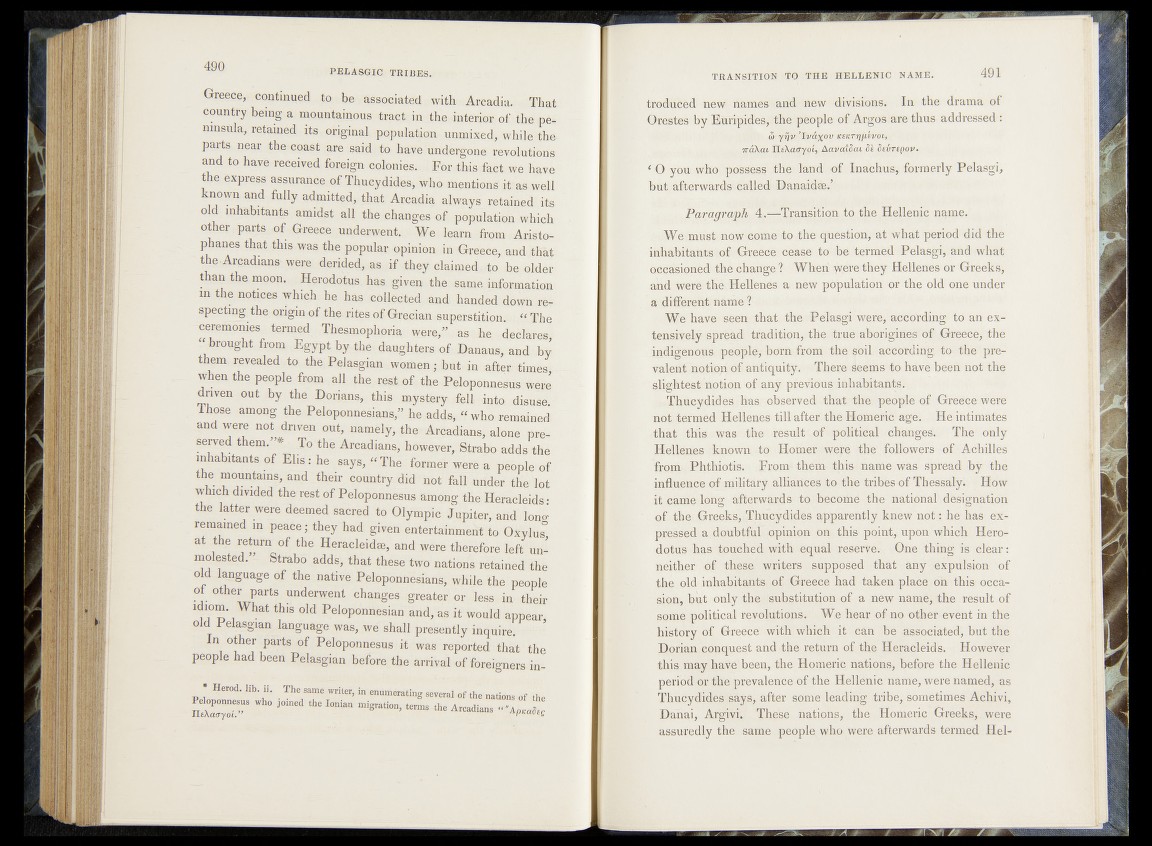
PELASGIC TRIBES.
Greece,- continued to be associated with Arcadia.,n ThafljS
°?untry feeinI a mountainous tract in _the interior of-the .peninsula,
retained its . original population unmixed, while the-
parts near the coast are said to have undergone revolutions
and to have received foreign uoloniës., | -For this .fact we have
the express assurance of Thucydides; who mentions it as well
known and folly admitted, that Arcadia always retained its
old inhabitants amidst all the changes of population which
other parts of Greece underwent. We learn from Aristophanes
that this was the popular opinion in Greece,/and that
the Arpadians were derided, as if they claimed . to b e n d e r
than the moon. Herodotus has given t h r n m e information
m the notices which he has collected and handed down rev
specting the origin of the rites of Grecian superstitions “ The
-ceremonies^ termed Thesmophoria w e re ,^ a s | he declares,
brought from Egypt by the daughters, of Danaus, and b¥
them, revealed to th e Pelasgian women; but in after tim e s-
when the people from all. the rest of the Peloponnesus were
driven out by the Dorians, this mystery .fell foto disuse!'1
Those among the PetoponnesianV’ -he-
and were not driven out, namely, the Arcadians, alone preserved
them.”* To the Arcadians, however, Strabo adds the
inhabitants of Elis: he sayS> «The former were a people of
the mountains, and their country, did not fall under the lot
which divided therest of Peloponnesus among the HeracleidÉ
the latter were deemed sacred to Olympic: Jupiter, arid
remained in peace; they had given entertainment to OXylus
at the return of the Heracleidae, and were therefore left unmolested.”
Strabo adds, that these two nations retained the
old language of the native Peloponnesians, while the people
ol other parts underwent changes greater or less in their
foiom. What this old Peloponnesian and, as it would appear,
old Pelasgiandanguage was, we shall presently inquire
In other parts of Peloponnesus it was reported that the
people had been Pelasgian before the arrival of foreigners in-
* Herod, lib. ii. The same writer, in emimerating several of the nations of the
Pdopo^nesus who loxned the Ionian migration, terms-the Arcadians S f l j B
TRANSITION TO THE BELBENIC NAME. 4 9 1
traduced riewt ri&rnë&l and newAdivisions. In the drama of
Orestes by Ehripideilthe'phople of Argos .are thus addressed:
KEKTr i f lkvOL, ij
‘ O you w h oA p b f^ ^ '^ - Inachus,- formerly Pelasgi,
bétfafoerward^èulied* Danaicke.’
Partagrq/ph/4.—Transjtion to the .Hellenic name.
WejmustvnoM®®foü tn tt.f e ^ ^ f o h 5 ia t!;'^hat period did the
inhabitantgj|g#ii&^^ and- what
qéetifopked'the-change ? W^pLy^reithey Hellenes or Greeks;
and were-the^HeÉerids' a new population for, th ë ’èld one under
a different name?
We have seen that^the ‘Pdfesgi^erei'wéfodingxfltcf art ex-*"
tensively spre'ad tradition>the -true aborigirieM of Greece, the
ind^i^u|fc^pi§pler-b0Tn foorn ■ the sfolf/ricfclofoin^lb^the prevalent"
notiop ofi.antiquity.'; Ther^seéhk 'to havé been’not the
' slightest notion ofia-nyi p|e^ij8:us;inhabitants.
,Thucyd)^;e^?hasli^hser;vedtthat tluï^b/iple ‘èfoGfoêce were
npblfSfmed Hellenes till afteri the Homeric age3. t- He intimates
that this was the result ef4apolitical cbètóge^.; The only •
Hellenes*? known_to Homer*werc the followers'fof Aehillèfè
from Phthiotis. .From* thepiyl|hi'&4-npame was' sfoeridr by the
influence of military alliances to the tribes of Thessaly. 11'ow
it came long afterwards to« hëcomë ' the national designation
of the Greeks, Thucydides apparently knew n o t: he has expressed*
a doubtful opinion'On thiagefot,- upcn^which Herodotus
has touched with equa%lpeSdr^i^ One th in g is clear:
neither of these, writers supposed * that any expulsion *of
the old inhabitants. ,o£ Greece had taken place oh this'occasion,
but only the.;'substitution of a new namë^the result .of
some political revolutions . We h e a r o&a© other event in thé
history oft Greece -with’ which ifie é n be Associated,,btut the
Dorian conquest and th e return Of the Heracleids. However
this may haVebe,en;the Honiërit: nations, before the Hellenic
period or the prevalence of the Hellenic name, were named, as
Thucydides's,ays, after some leading- tribe; sometimes Achivi,
Dariai, Argivi.- These natidfts, the Homeric Greeks, were
assuredly the- same. people^who were afterwards termed IIel